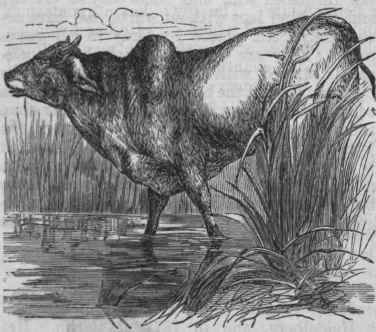Zebu (Bos Indicus Linn)
Description
This section is from "The American Cyclopaedia", by George Ripley And Charles A. Dana. Also available from Amazon: The New American Cyclopędia. 16 volumes complete..
Zebu (Bos Indicus Linn)
Zebu (Bos Indicus Linn), the Brahman bull, a variety of the domesticated ox, characterized by a large fatty hump on the shoulders. It is found in India and its archipelago, Ohina, Arabia, Persia, and on the E. coast of Africa. This variety is very small, sometimes not exceeding a large dog in height; the ears are long and pendulous, and the horns sometimes absent. Zebus are held sacred by the Hindoos, who consider it a sin to kill them, and allow them great liberties; they are made to work, however, and harnessed to a carriage will travel 30 in. a day. The hump is considered by English residents in India delicious eating. It is forbidden to take the bulls out of the country; but a female brought to America, and publicly exhibited here in 1861-'2, gave birth to a male calf on the passage, and there is a male in the Central park, New York, and one in Prospect park, Brooklyn. These specimens have small horns; the female is about the size of a yearold heifer, but with shorter legs, and is of a mixed mouse and hoary gray color, very gentle, and with remarkably soft hair; the male is brown, with coarser hair, and less gentle.
The cattle of the Dutch East Indian colonists are mostly of this race, but larger, and considerably crossed with the Sunda ox (los Sondaicus).

Zebu.
Continue to:


